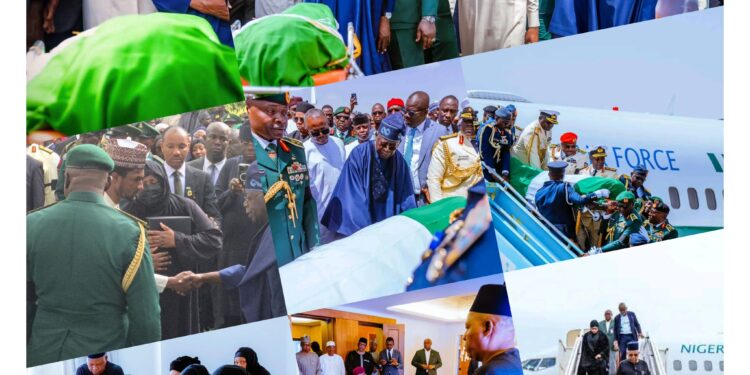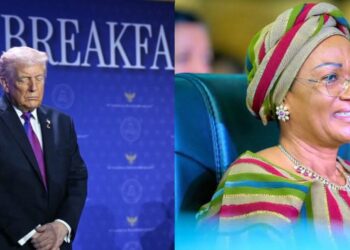
The Merit Newspaper Editorial
The final rites accorded to the late former President Muhammadu Buhari by the government of President Bola Ahmed Tinubu stand as a testament to national gratitude and democratic civility. The funeral protocol, both symbolic and dignified, reflects a conscious effort by the Presidency to immortalise a leader whose tenure reshaped Nigeria’s political, economic, and security architecture, albeit not without controversy.
In a rare gesture that deviated from the traditional repatriation of deceased dignitaries, President Tinubu instructed that the remains of Buhari be flown back from London in the passenger cabin of the presidential aircraft rather than the cargo hold. This marked a departure from past practices involving other high-profile figures who died abroad. It symbolised respect not just for the man, but for the office he held. The act underscores the Tinubu administration’s commitment to honouring Nigeria’s democratic institutions and their past custodians.
More telling was the high-level delegation led by Vice President Kashim Shettima, which included the Chief of Staff, Femi Gbajabiamila, and other senior officials. Their journey to London to accompany Buhari’s remains home was not merely ceremonial. It was a national acknowledgement of Buhari’s service and sacrifice, whether as a military ruler between 1983 and 1985 or as a democratically elected president from 2015 to 2023.
READ ALSO:FG Declares July 15 Public Holiday to Honour Late President Muhammadu Buhari
The burial ceremony in Daura, Katsina State—Buhari’s hometown—was attended by President Tinubu himself. That singular act of presence by a sitting president at the funeral of a predecessor is historically significant. It mirrors similar moments in global history where heads of state set aside political and ideological differences to honour their predecessors. By bowing and saluting before the casket, President Tinubu offered the highest form of national homage, transcending the realm of politics and echoing the solemn unity that death demands of the living.
Furthermore, the declaration of a national public holiday on the day of Buhari’s burial is both symbolic and strategic. It allowed Nigerians across all divides to reflect on the former president’s legacy—his strengths, his flaws, and the indelible imprint he left on the nation’s fabric. In a country grappling with economic hardship and political disillusionment, that moment of pause was as much a tribute as it was a call for introspection.
READ ALSO:Aregbesola Says Tinubu Changed Nature—Really? (Video)
While public opinion remains divided over Buhari’s tenure—ranging from commendation for infrastructure development and anti-corruption efforts, to criticism over insecurity and economic downturn—the final honour accorded him is a lesson in statecraft. In life and in death, national leaders must be treated with dignity. That is the cornerstone of any enduring democracy.
The Merit Newspaper editorial board considers the actions of President Bola Ahmed Tinubu and his administration as not only appropriate but exemplary. In offering Buhari a farewell marked by reverence, dignity, and institutional respect, Tinubu has set a precedent for national unity in grief, regardless of partisan leanings.
READ ALSO:Bullion Records Star, Harcher, Drops Dazzling Music Video for Hit Single ‘Stamina’
In these final gestures, we find a renewed hope for civility in governance. And for that, the current administration deserves commendation.

















